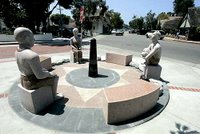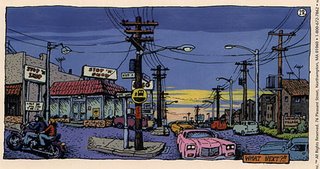
In a Yahoo group I dabble in, someone reposted and praised
this article about 9/11 by a Benedictine nun named
Joan Chittister. I demurred and referred to an
earlier post on this blog about oikophobia, which in turn led to a snark exchange I won't bother to repeat except that I was accused of spouting "talk radio drivel."
Sr. Chittister's piece reminds me just how odd the moonbat fringe of the American Catholic left. I am an admirer of
the Anchoress,
First Things, and
this fine piece on Islam by the Archbishop of Sydney, Australia. There is, however, a visible moonbat fringe among the faithful. Think
Christic Institute. Think
Berrigan Brothers. Think
a trio of clowns from
Nukewatch.
Here are my comments, slightly revised from the Yahoo group post:
Since the whole Chittester article is posted, I’ll summarize what I think the article says, and quote portions. Fair enough, I think, because you can check the text to see if I’ve distorted anything she says.
1. Airport Searches.
“We are a country held hostage by fear.”
It's difficult to go through an airport these days [and in foreign
airports there are fewer or less intrusive searches].
COMMENT: Airport security isn’t always well-managed, but we haven’t
had a hijacking since 9/11. Is she saying we should not have airport
security? That it should be managed better? If the latter, I agree.
2. Our Post 9/11 Policies Were Mistaken.
“There's nothing esoteric here. Read the front page of any newspaper and the direction is clear.”
A. What we should have done:
“[W]orking with moderate governments and the world community . . . of courting public opinion and international support, . . . trying to understand the U.S. image around the world and working to change it, . . . asking why gleeful children danced in the streets when the Twin Towers fell, . . . doing something positive to correct it . . “
COMMENT: (1) Fundamentally, she’s arguing that 9/11 was our fault, we provoked the attack, and we should appease our attackers, or at least their sympathizers.
(2) The US has achieved a fair amount of cooperation on anti-terrorism activity, even from places like France whose governments repeatedly bad-mouth the US.
(3) There is no “world community.” There is the UN, which is a corrupt cartel of tyrants, not a community. There are countries, and each is different.
(4) Our society, at least the policy-conscious part of it, has spent a lot of energy trying to understand Islam and Islamic radicalism--go to any bookstore.
(5) The notion that we are responsible for the attacks on us is only true to a very limited extent. People who want to restore the Caliphate and restore Andalusia to Muslim rule (Bin Laden), or evoke the return of the 12th Imam (Ahmadinejad), are not just upset because of one or another US policy. If we did everything they asked, they’d take it as a sign of weakness and keep on with their program. If we resist, the use our resistance to justify jihad.
B. What we did:
“We did the frontier thing and began to kill people ourselves. As in "That'll show ' em who's boss."
COMMENT: Well, yes. Afghanistan harbored the people who killed more Americans than at Pearl Harbor, and destroyed an important part of our largest city. They wouldn’t give them up. Act of war. A military response was appropriate.
Reasonable minds can differ about the wisdom of the Iraq War. We did, however, take out some really bad people, and we are fighting some really bad people. The author’s purpose is not to provide an answer. I don’t think those who think as she does have any good ones.
3. A. The U.S. has provoked terrorism and nuclear arms ambitions of Iran, Korea, and Pakistan.
“By defining the attack on the Twin Towers as the declaration ofglobal war, it has made global war a reality . . .”.
“By launching high technology weapons against countries whose armies are under equipped and whose borders are porous, we have even managed to reinstitute a nuclear arms race. Iran, Korea, and Pakistan have all joined the new race out of fear of what might happen to them . . . in the future.”
COMMENT: The modern war of Islam against the West has been going on for a while--at least since the Iranian embassy event. The difference is that after 9/11, for the first time, we began to fight back.
Iranian, Korean and Pakistani nuclear programs and ambitions preceded 2001. Pakistan was responding to India, not the US. North Korea is the last, horrendous avatar of Stalinism and has its own regional agenda
.
B. Iran, Korea and Pakistan are not evil and do not need regime change
“ . . . our unilateral decree that they are evil and in need of regime change.”
COMMENT: I submit that Iran and North Korea can accurately be described as evil. They are not an “axis,” as Bush suggested. Régime change in each is desirable. Pakistan is complex, but a person who believes in state redistribution of wealth, such as the author, not to speak of religious freedom, might well have issues with Pakistan, too.
What (if anything) the US should do to achieve such change is an open question. It may be that watchful waiting is the best policy.
4. The US is a Torture State.
“So we fight in the dark everywhere, claiming thousands of innocent lives and few "terrorists." We do it against those who claim no flag, no government, no terms of peace, and we may never know if we have managed to defeat them or not.
“While old ladies and small children go on forever removing their jackets and shoes and cell phones in U.S. airport security lines, the United States has been exposed as a torture state.
“The government refuses to submit its military behavior to an International War Crimes Tribunal and so, as far as the rest of the world is concerned, admits that its behaviors are in question.”
COMMENT: Yes, this is a twilight, ambiguous struggle. So be it.
The US as “torture state” is an overheated exaggeration. Torture states do not try their soldiers for misconduct, allow their courts to instruct the executive on the limitations of its prerogative, or pass bills outlawing torture. Have prisoners been mistreated? Yes. Is some of the executive complacent about this? Yes. Is that a legitimate concern. Yes. But “torture state” is overheated rhetoric.
There are good reasons not to trust an International War Crimes Tribunal, and some good reasons to do so. Personally, I think the author’s crush on international institutions and the “world community” is misguided and a symptom, precisely, of oikophobia.
5. 9/11 Was Done by 19 Independent Fanatics.
“And all of this on account of 19 politically independent, unauthorized fanatics.”
Fanatics, yes. Inspired by an ideology, and directed by a network, sheltered by a state actor (Taliban Afghanistan). The political movement in question has neither disappeared nor been defeated.
6. We Are Fighting the Wrong People and Haven’t Prevailed Yet.
“They provoked from us an all-out irrational response against the wrong people . . . “
“Meanwhile -- has anybody noticed -- Osama bin Laden is still free somewhere and sending us tapes? The Taliban have returned to Afghanistan. Millions of civilians have either left Iraq, are internal refugees in their own country or have been killed there in order to protect them.”
COMMENT:This struggle is a long, twilight struggle. True, we haven’t won yet, but that doesn’t make the struggle unworthy. The article, however, is not a tactical or strategic critique, which, if thought out, would be welcome.
Rather, it implies we should not be fighting at all. I disagree, as do most Americans.
7. We Are Losing the Constitution.
“And here, in the United States, paranoia grips the land. The
Constitution is being shredded one line at a time.”
COMMENT: As in every war, there is a tension between civil liberties and what is thought to be military necessity. But the Constitution shredded? Blatant hyperbole.
8. War Spending Has Prevented the Enactment of More Welfare State
Policies, Which Are Good Things.
“We are facing a decade-long moratorium on social issues . . . universal medical insurance, day care services, subsidized housing or welfare programs, and the army is where the young go to get an education.”
COMMENT: This is not the place to debate these welfare state issues. Social spending, especially education spending is actually up, although much is wasted due to the teachers’ unions and the educationists. There has been no decline, post 9/11, in any of this.
And in fact, the country, wisely, has not voted for high-tax, redistributionist social reforms. Many of these proposals are in fact dangerous to the economy, to liberty, and to good morals. Read
Theodore Dalrymple, for example.
9. We Should Have Responded Differently, But I’m Not Saying How.
“From where I stand, it isn't that 9/11 did not demand a response. It's that the response we made has the smell of inanity.”
COMMENT: I know the purpose of the article was not to propose alternative policies, although these are implied (make concessions to the Islamist program, bend the knee to one or another supranational organization, enact massive social welfare programs, take no military action even against those who harbored the organizations that attacked us).
Was our response perfect? No, far from it. Would the opposition have done better? I doubt it. Is there more we can do. Yes.
GENERAL COMMENT: In its hyperbolic language about every flaw in US conduct, its unwillingness to present an analysis of Islamist terrorism other than to say generally US policy provoked it, in its alarmism (for instance, about the shredded and presumably about to be stir-fried Constitution), and in its deference to supranational institutions, Sr. Chittister's article is an example of oikophobia.













